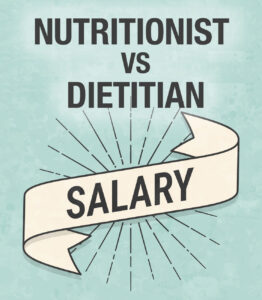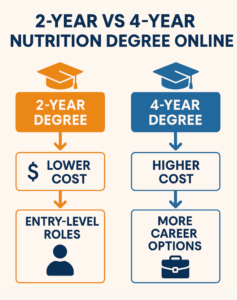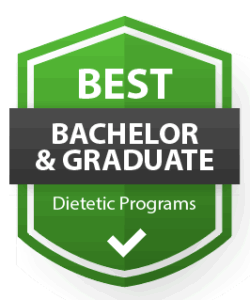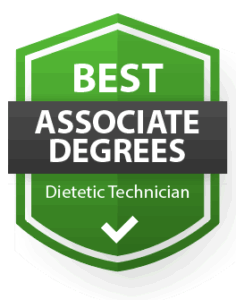
Nutritionist vs Dietitian Salary: What’s the Real Difference?
If you’re considering a career in nutrition, one of the first questions you may ask is: How much do nutritionists and dietitians make? While the terms are often used interchangeably,
Learn the State by State Requirements
Have you ever thought of becoming a dietitian or a nutritionist? You might not realize that, although both of these careers fall under the heading of food science, there are subtle differences between these two categories of careers. Over the following pages, you will learn the unique characteristics of nutritionist careers, dietitian careers, and specialized careers within both categories. As each state has its own licensure and certification requirements for dietitians and nutritionists, we will elaborate upon these requirements and what education, experience and examinations you must fulfill in order to become a food health professional in these states. We will also discuss what type of living you can expect to earn as a nutritionist, as a dietitian, and within the specialized career titles underneath each broader heading.
When you hear the words “nutrition” and “dietetics,” what comes to mind? For many people, the answer to this question is “food.” Nutrition and dietetics are two categories included within the broader field of nutritional sciences. Some of the degree titles that you may listed for students who are interested in studying nutrition and/or dietetics include:
The difference between nutrition and dietetics really comes down to the differences between the requirements for the professions of nutritionist and dietitian. Both professions have their own regulations regarding education, training, experience and testing that must be followed, depending on the state in which the food professional wishes to work. The Academy of Nutrition and Dietetics (AND) is the organization that regulates the licensure and registration of dietitians and nutritionists. We will explore, in further detail, licensing requirements in each state for nutritionists and dietitians, the titles that these professionals may go by, and whether non-licensed nutritionists or dietitians can practice in each state, in these pages.
It used to be easy to distinguish between a nutritionist vs dietitian: typically, dietitians could be registered, but nutritionists were not always registered. Now, however, terms have become interchangeable, and it can seem confusing to a layperson who is trying to discern which professional is authorized to do what in which state. View the difference between a licensed and non-licensed nutritionist.

MPH, RD, LD, FAND
Clinical Dietitian at UH Rainbow Babies and Children’s Hospital in Cleveland, OH

Halifax, Nova Scotia, Canada
University of Montreal
Member of the Nova Scotia College of Dietitians and Nutritionists (NSCDN)

El Paso, Texas
University of North Carolina Chapel Hill
Registration Eligible | Food Blogger | Recipe Developer
Certain food professionals are regulated by the Commission on Dietetic Registration (CDR) of the AND.
These include:
A Registered Dietitian (RD) may also be called a Registered Dietitian Nutritionist (RDN). According to the CDR, as of January 31, 2022, there are 108,673 RDs and RDNs registered in the United States. Many states require dietitians and/or nutritionists to be registered with this organization in order to be licensed to practice there.
The terms Nutrition Dietetics Technician, Registered (NDTR) and Dietetic Technician Registered (DTR) both refer to the same profession, also regulated by the CDR. There are currently 4584 NDTRs and DTRs registered in the U.S.
The information provided on this map offers a simplified overview of intricate state laws and regulations. Choose a state to access a summarized version of its legislation.
Individualized nutrition counseling, excluding medical nutrition therapy in select states, is legal for all. Certain states provide state licensure or certification opportunities for CNSs, RDs, and other proficient nutritionists.
Engaging in personalized nutrition counseling without proper licensure or exemption is illegal. However, there exists a route to obtaining licensure for CNSs, RDs, and other experienced nutritionists.
Engaging in personalized nutrition counseling without proper licensure or exemption is illegal, with licensure primarily limited to registered dietitians (RDs).
| Credential | Definition | Requirements |
|---|---|---|
| RD/RDN | Same credential, protected title, can work in clinical settings | Master’s degree + internship + national exam |
| Licensed Nutritionist | State-regulated, requirements vary | Bachelor’s minimum, varies by state |
| Nutritionist | Unregulated in many states | Varies widely, certificate to degree |
Additional food professional careers required to be registered with the CDR, and their current totals nationwide, are:
(0 – 1000 careers)
Many entry-level positions in nutrition can be earned with an associate’s degree or a certificate in nutrition. Getting your associate’s degree is a great way to get...
If you are thinking of pursuing a nutrition bachelor’s degree, there are many formats available to you. Degrees are offered completely online, in a hybrid fashion...
becoming a registered dietitian is merely one of the career options that those who have a master’s nutrition degree can seek. While many students pursuing a master’s...
Other organizations offer specialty certifications for RDs and RDNs who are interested in concentrating on a specific area of nutrition and dietetics. They include, but are not limited to:
The Clinical Nutrition Certification Board (CNCB) is another certifying body for licensed nutritionists. Some states accept nutritionist certification through this board for licensure to work there. Nutritionists certified by the CNCB may use the following credentials:
Certified Clinical Nutritionist (CCN)
Some states accept nutritionist certification through the Board for Certification of Nutrition Specialists (BCNS) of the American Nutrition Association as valid for licensure to work there. The BCNS certifies professionals who use this title:
Certified Nutrition Specialist (CNS)
They also offer specialty certifications, including:
Certified Ketogenic Nutrition Specialist (CKNS)
Certified Nutritional Genomics Specialist (CNGS)
Above, we covered the major credentialing bodies accepted by states who require dietitians and nutritionists to be licensed in order to work. Nutritionists, typically, should have a minimum of a bachelor’s degree in order to practice. Some states, however, do not require this. We will now examine the non-licensed nutritionist. Non-licensed nutritionists may pursue education, or not, and may pursue credentials, or not, in order to be able to call themselves nutritionists.
There are other credentials that nutritionists may pursue, although these are not necessarily aligned with state licensure requirements. Many of these certifications do not require a college degree to obtain. Some of them include:
Certified Nutrition Coach (NASM-CNC)
Autoimmune Holistic Nutrition Specialist
Holistic Nutritionist Certification
Nutrition & Wellness Consultant Certification
Nutritionist Consultant Certification – Master Level
Weight Management Specialist Certification
Sports Nutrition Certification
Senior Nutrition Specialist Certification
Youth Nutrition Specialist Certification
Nutritionist
Sports Nutrition Specialist
Level 1 Certification (PN1)
Sports Nutrition Specialist (SNS)
According to the AND, as of 2022, in almost all states, either dietitians, dietitian nutritionists, or nutritionists must be licensed in order to practice. There are a few states that are exceptions to this rule.
In these states, no current regulations or laws exist that specify what type of education, training, licensure and/or certification dietitians and nutritionists must have in order to be licensed in that state. They include:
Keep in mind that, although the above states may not require dietitians and/or nutritionists to be licensed to legally work in that state, most dietitian jobs still specify that the candidates must be Registered Dietitians through the CDR.
In these states, the titles of dietitian and/or nutritionist are restricted and only allowed to be used by certain credentialed professionals. No formal regulatory board exists for dietitians and/or nutritionists in these states, and no license is required to practice. They are:

If you’re considering a career in nutrition, one of the first questions you may ask is: How much do nutritionists and dietitians make? While the terms are often used interchangeably,

If you’re interested in becoming a nutritionist, you may be wondering whether a 2-year or 4-year online degree program is the better choice. The answer depends on your goals, timeline,

Libraries are trusted, welcoming spaces that bring communities together to learn, grow, and thrive. In recent years, libraries have expanded their role beyond books to become active partners in

Choosing the right dietetics program is a critical first step toward becoming a Registered Dietitian Nutritionist (RDN)—especially as the field continues to evolve with new education models and licensing requirements.

How We Chose the Best Dietetic Technician Associate Degree Programs in the U.S. Becoming a Dietetic Technician, Registered (NDTR) is a practical and rewarding way to enter the field of

The way we work in health and wellness is changing fast. With the rise of remote work, more aspiring nutrition professionals are wondering: Can you really become a virtual nutritionist?
